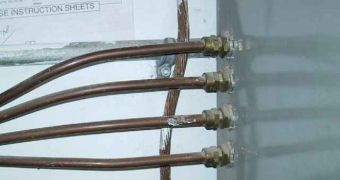One of the major problems associated with electrical wires is the fact that they lose a lot of energy through their coatings. Most of the times, this lost power is radiated as heat, which explains why circuits and wires get warm, and sometimes even melt. Engineers and physicists have been working for a long time on methods of reducing the amount of power that is lost due to poor insulation, and now scientists from the University of Southampton, in the UK, may have just found a solution.
According to AlphaGalileo, if the new insulating material works as good as its creators say it does, then the work may have just opened the door for a new generation of high-efficiency electrical generators. But researchers at the university have much bigger plans for their new prototype insulation system. They say that it could theoretically be used to improve the energy conversion efficiency of electrotechnical systems used in a wide variety of applications. In addition to generators, motors too could benefit from the advantages of losing less power during standard operations.
The team behind the accomplishment is based at the University of Southampton School of Electronics and Computer Science (ECS). The scientists are all members of the Electrical Power Engineering group, which is the recipient of a €3-million grant from the European Union. Their efforts, which were coordinated by engineers and professors Alun Vaughan, Dr Paul Lewin, and Dr Gabriele Gherbaz, are part of a larger, continent-scale initiative, called Advanced NAno-Structured TApeS for electrotechnical high power Insulating Applications (ANASTASIA).
“The current insulation systems used in generators are old fashioned and are rather thick, poor thermal conductors. Our aim is to replace the current insulation tapes with new materials integrated with nanofilters to increase the ability to dissipate heat and withstand high electrics field strengths,” explains Vaughan. He adds that even the slightest improvement in the European power grid, of say 0.2 percent, could save up to €1.5 billion, or eliminate the need for operating a nuclear power plant producing about 1,000 megawatts of electricity per year. Naturally, a 1 percent improvement could save even more money.

 14 DAY TRIAL //
14 DAY TRIAL //